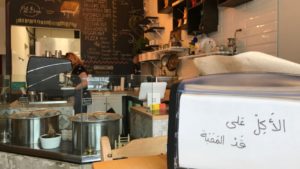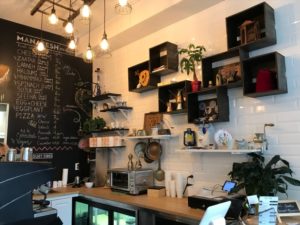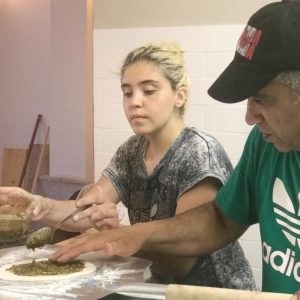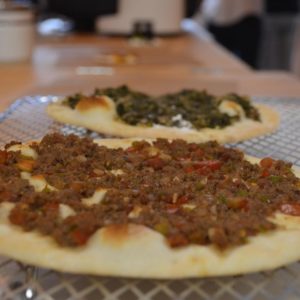
Until recently, Syrian food was hard to come by in Toronto.
But that’s starting to change, thanks to the recent influx of more than 40,000 Syrian refugees to Canada — including around 11,000 in Toronto, where Syrian cuisine is beginning to take root.
The new ventures range from shiny new cafés to stalls at farmer’s markets to a collective of Syrian women sharing traditional recipes from home with the wider public.

This month, the New York Times is dedicating its Food section to Canadian cuisine — and one of their contributors is Day 6 food columnist David Sax, who wrote a feature on how Syrian newcomers are helping shape how we define “Canadian” cuisine.
Among the emerging Syrian ventures that Sax has taken note of is Soufi’s, a new café in the heart of downtown Toronto that serves mana’eesh, a traditional flatbread with toppings akin to a pizza, and knaffeh, a pastry dessert with cheese soaked in syrup.

A taste of home
Soufi’s was established in August 2017 by the Alsoufi family, originally from Damascus, who noted the lack of Syrian eateries in Toronto.
Jala Alsoufi, 25, first moved to the city in 2012 to attend university, and her family soon followed. When her father’s engineering background was not recognized in their new homeland, the family decided to put their energy into Soufi’s.
“It’s nice when you bring a piece of home into a new place and share it with other people,” Jala Alsoufi tells Day 6 at her family’s restaurant, a bright and cozy spot near one of the city’s most popular parks.

“A classic mana’eesh that I usually recommend is the za’atar — it’s a blend of thyme, olive oil and oregano — and it’s topped with tomatoes, cucumbers and fresh mint. And I usually recommend adding labneh (a strained yogurt) to it, or cheese. If you add cheese on top of it, it’s amazing,” she says.
While dishes like mana’eesh and knaffeh can be found throughout the Middle East, Syrians are keen to recreate their particular regional variations on those recipes when they bring their dishes to Canada.

“Syrian food is a very specific type of Middle Eastern cuisine,” Sax says. “I think we lump Middle Eastern in this vast area and it has similarities to other … foods, whether it’s Lebanese or Palestinian or Israeli food, but it’s comprised of some of the oldest cuisines and oldest traditions.”
“Aleppo, a city that’s now essentially in ruins, was the cradle of food in the Middle East for thousands of years. So it is in many ways multicultural, in many ways very typical of the area, and it involves a tremendous range of flavours that we’ve only really seen a smidgen of here.”
‘A universal language’
Some of the entrepreneurs behind the new wave of Syrian food businesses have a prior culinary background.
But others, like the Alsoufis, are starting up culinary ventures for the first time as a way of sharing an important piece of their traditions with their new neighbours.
Newcomer Kitchen, a group of chefs who prepare takeout Syrian dinners, is one such initiative. It was established in March 2016 as a way of giving newly arrived Syrian refugees a chance to cook food from home.
It has since grown into a collective of 60 cooks who work out of The Depanneur, a west-end community food hub, although funding has been challenging to come by.
“It’s this incredible mix,” Sax says of the Syrians bringing their cuisine to the Toronto food scene.
“I think the thing with immigration and restaurants and food businesses started by immigrants is you get this tremendous swath of the population — on one side, you have people whose families had a food business, who worked in restaurants, who were home cooks or professional cooks; on the other side, people who were accountants and lawyers who can no longer work are saying, ‘Well, I know how to cook.'”
“That’s why so many immigrants do well and flourish in the food business, because there is very little barrier to entry, and food is a universal language.”
The new wave of Syrian cuisine isn’t just limited to big cities like Toronto.
“Certainly it’s happening around Canada,” Sax says. “I mean, where my cottage is, [in] Medford, Ontario, which is a very small town, I think there’s probably one or two Syrian families there and at the farmer’s market in the summer, they’re selling kibbeh and little meat pies and hummus and babaganoush.”
“You see businesses in Montreal, you see it in Vancouver and Ottawa — it’s wherever the population is. Those people are are going to find that opportunity, and there will obviously be an audience for that.”
Sax says many American readers will likely be unfamiliar with Syrian cuisine, because aside from a few very specific areas like Dearborn, Mich., the U.S. hasn’t experienced the same kind of wave of newcomers from that region.
“In other areas where the Trump administration’s restrictive immigration policies [are in place], you know there’s not a lot of Syrian refugees that have gotten into the United States. And so if you don’t have those people, you’re not going to have that food,” he says.
Traditional treats
Some Syrian food purveyors in Toronto go to great lengths to ensure their products measure up to the versions they remember from home.
Sax recalls a visit he paid to Crown Pastries, a baklava and sweets shop in Scarborough owned by brothers Ismail and Rasoul Alsalha. Their grandfather owned a shop in Aleppo by the same name which was destroyed in the war.
“They make the most incredible baklava, the most incredible nut-filled, butter-filled pastries,” Sax says.
The brothers are so particular about the ingredients they use that they pay someone roughly $500 a litre to bring over rosewater from Aleppo twice a year, Sax says.
“It comes in a plastic bottle, and it looks like blood,” he marvels. “It’s smuggled across the lines of various different parts of the war, across different warring factions and Islamic extremist groups through Turkey and onward to Canada, where they pay for it.”
“You can get rosewater here from other Middle Eastern countries, but they insist that this has to be it — this is the key to having the taste and the flavour in what they do. And that commitment to keep that tradition and these flavours alive is what makes these places so much more important than just somewhere to get a good meal.”
Media attention has helped shine a light on the new Syrian ventures, but in a food scene as competitive as Toronto’s, can these small businesses last beyond positive reviews and word of mouth?
“It depends,” Sax says. “Of the half a dozen that have popped up in the past two years, the majority I hope will [stick around], but some of them already are saying privately to me, ‘Look, this is not what I want to do with my life — I’m using this as a stepping stone. I don’t want to work behind a hot stove.'”
“Food businesses succeed or fail based on whether enough people want to go and pay to buy that food,” he adds. “So at the end of the day, the quality and the value is going to stick out, and how well they run their business. And that doesn’t matter where they’re from — that’s sort of a universal law wherever you are.”
Crown Pastries, which has been around since 2009, is the veteran of the local crop of Syrian eateries — and happens to be Sax’s favourite of the bunch.
“Every time I go there, I’ll spend $20 and get a huge, heavy, dense box of baklava and chocolate sweets and these incredible things I’ve never tried, and I’ll come home and I say to my wife, ‘Well, we’ll just have a taste,’ and I just gorge on this stuff for days,” he enthuses. “It’s so unbelievable — it’s like no other baklava or Middle Eastern sweet I’ve ever had, and I’m always happy to go back for more.”


